What is food trailer insurance and why is it important for mobile food businesses?
Food trailer insurance is a specialised policy that protects mobile food vendors against risks such as theft, damage, liability claims, and business interruptions. This tailored insurance ensures your food trailer, equipment, stock, and income are covered, enabling you to operate confidently and comply with legal requirements.
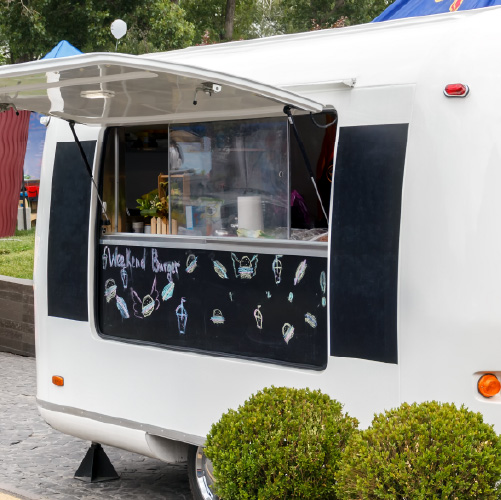
Why Food Trailer Insurance Is Vital for Mobile Food Businesses
Mobile food businesses like food trailers and food trucks have become increasingly popular in Australia’s vibrant food scene. Whether you’re operating at markets, festivals, or on the street, your food trailer is a valuable business asset.
Running a mobile kitchen presents unique challenges. From the risk of accidents on the road to damage while stationary, the exposure is different from a traditional bricks-and-mortar business. Without the right insurance, even a small incident could lead to significant financial loss or legal trouble.
Food trailer insurance offers protection specific to these risks, giving business owners peace of mind and security to focus on delivering great food.
What Does Food Trailer Insurance Typically Cover?
Food trailer insurance policies vary between insurers, but most include a combination of the following essential covers:
1. Trailer and Equipment Coverage
Your food trailer itself, along with the kitchen equipment inside, such as ovens, fryers, refrigerators, and cooking tools, are protected against:
- Accidental damage from collisions or mishaps
- Fire or explosion caused by cooking equipment or external factors
- Theft or vandalism, whether parked or operating
- Storm, flood, or other natural disasters
This coverage is vital as repairs or replacements for specialised kitchen equipment can be costly.
2. Stock and Inventory Protection
Your food stock, including fresh ingredients, beverages, packaging, and disposables, represent ongoing business investment. Certain policies cover losses due to spoilage, contamination, or refrigeration breakdown, protecting your stock while it’s stored or on the move.
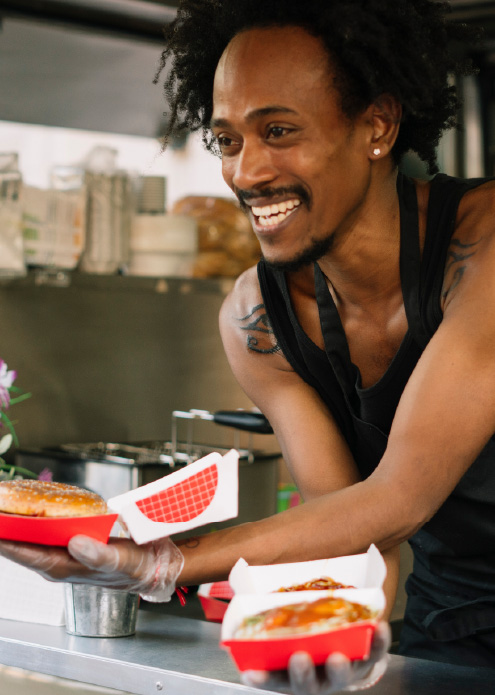
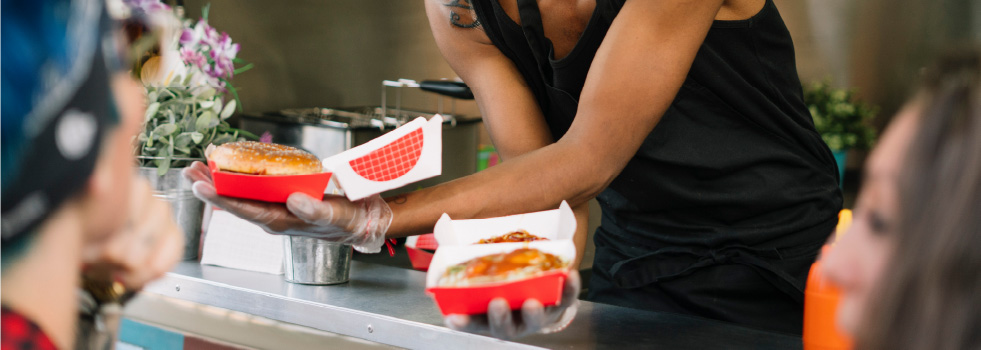
3. Public Liability Insurance
This protects your business if a customer or member of the public is injured or if their property is damaged because of your food trailer operations. This includes slips, burns, or food-related illnesses, covering legal fees, medical expenses, and compensation.
Public liability cover is often a legal or permit requirement and essential for protecting your business’s reputation and finances.
4. Business Interruption Cover
If your food trailer is damaged or stolen, preventing you from trading, business interruption cover can compensate for lost income during repairs or replacement. This helps manage cash flow during unexpected downtime.
5. Roadside and Transit Protection
Given that food trailers are mobile, insurance often includes coverage for damage or theft while the trailer is being towed, transported, or parked. This reduces vulnerability during loading, unloading, or transit between events.
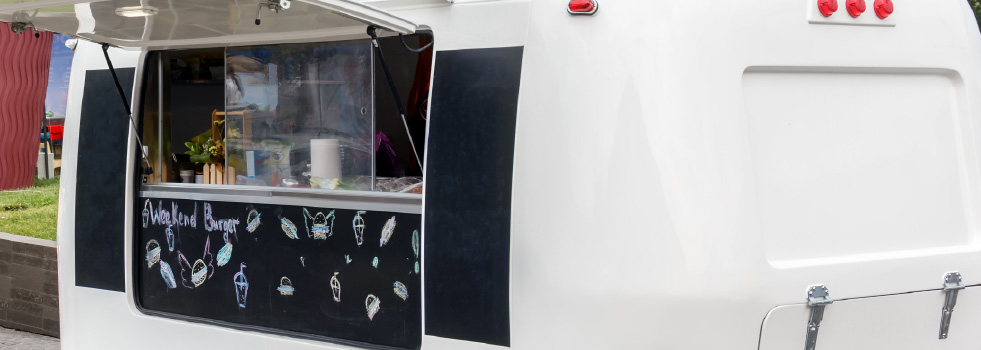
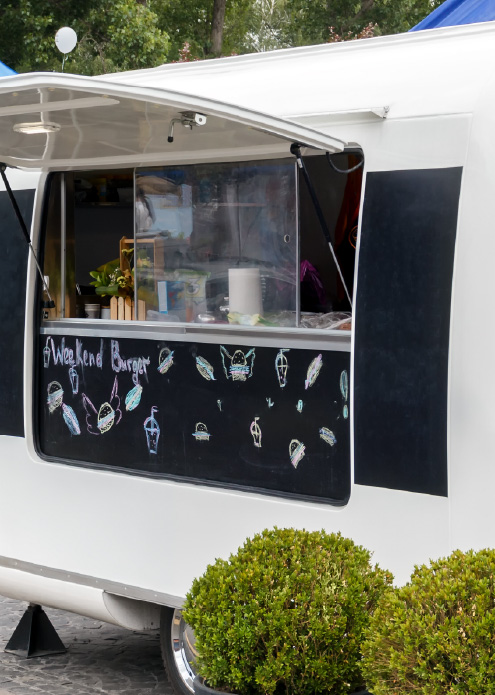
Different Types of Food Trailer Insurance Policies
Choosing the right type of insurance depends on your business size, operations, and risk profile.
Comprehensive Food Trailer Insurance
This offers the broadest protection, covering trailer damage, equipment, stock, public liability, and transit risks. It is best suited for vendors who frequently operate and carry substantial equipment or stock.
Third Party Liability Insurance
Primarily covers damage or injury caused to others due to your operations. It’s usually the minimum level required to meet legal and permit conditions but won’t cover damage to your trailer or equipment.
Equipment-Only Insurance
This specialised policy covers expensive kitchen appliances and tools inside the trailer but excludes the trailer itself. It suits leased trailers or owners wanting to separately insure their equipment.
What Influences Your Food Trailer Insurance Premium?
Your insurance cost depends on a few factors, including:
1. Value of Your Trailer and Equipment
More expensive trailers and commercial kitchen appliances increase the premium as repair or replacement costs rise.
2. Operating Locations and Frequency
Frequent trading at high-traffic events, festivals, or busy urban areas may attract higher premiums due to increased risk of accidents, theft, or damage.
3. Business Age and Claims History
Established businesses with no previous claims usually receive better rates. Conversely, frequent claims can increase premiums.
4. Annual Turnover and Stock Volume
High sales volumes usually mean more stock and cash on hand, increasing risk and insurance costs.
5. Security Measures
Installing GPS trackers, alarms, CCTV cameras, and secure parking can reduce your premiums by lowering theft and vandalism risk.
High sales volumes usually mean more stock and cash on hand, increasing risk and insurance costs.
Legal Requirements for Food Trailer Insurance in Australia
While public liability insurance is often required by local councils and event organisers to obtain trading permits, not all states mandate specific food trailer insurance by law.
If your trailer is registered as a road vehicle, compulsory third party (CTP) insurance is mandatory for registration but only covers injury to others—not damage to property or your trailer.
Having sufficient food trailer insurance protects your investment and ensures compliance with permit conditions and business requirements.
What to Do If You Need to Claim on Your Food Trailer Insurance
In case of damage, theft, or liability claims:
- Notify your insurer promptly to start the claims process.
- Document the incident thoroughly, including photos, police reports, and witness statements.
- Provide receipts and proof of ownership for equipment and stock.
- Follow the insurer’s instructions carefully for repairs or replacements.
Maintain communication to ensure a smooth, timely claim settlement.
Common Risks Faced by Food Trailer Operators
- Traffic accidents during towing or on-site manoeuvring
- Theft or vandalism while parked or unattended
- Equipment breakdown or fire hazards in the kitchen
- Food contamination or spoilage due to refrigeration failure
- Customer injuries leading to liability claims
Awareness and preparation for these risks can minimise losses and insurance claims.
Final Thoughts
Food trailer insurance is an indispensable safety net for Australia’s growing mobile food sector. With tailored cover protecting your trailer, kitchen equipment, stock, and liability, you can confidently focus on growing your business and serving customers.
Understanding the different coverage options, legal requirements, and risk factors ensures you select the right insurance policy. By maintaining good safety practices and regularly reviewing your insurance needs, you can safeguard your mobile food business against unexpected setbacks and thrive in a competitive market. Contact Truckie Cover today and our team can get you started on a tailored insurance plan just for you.
